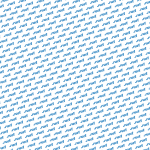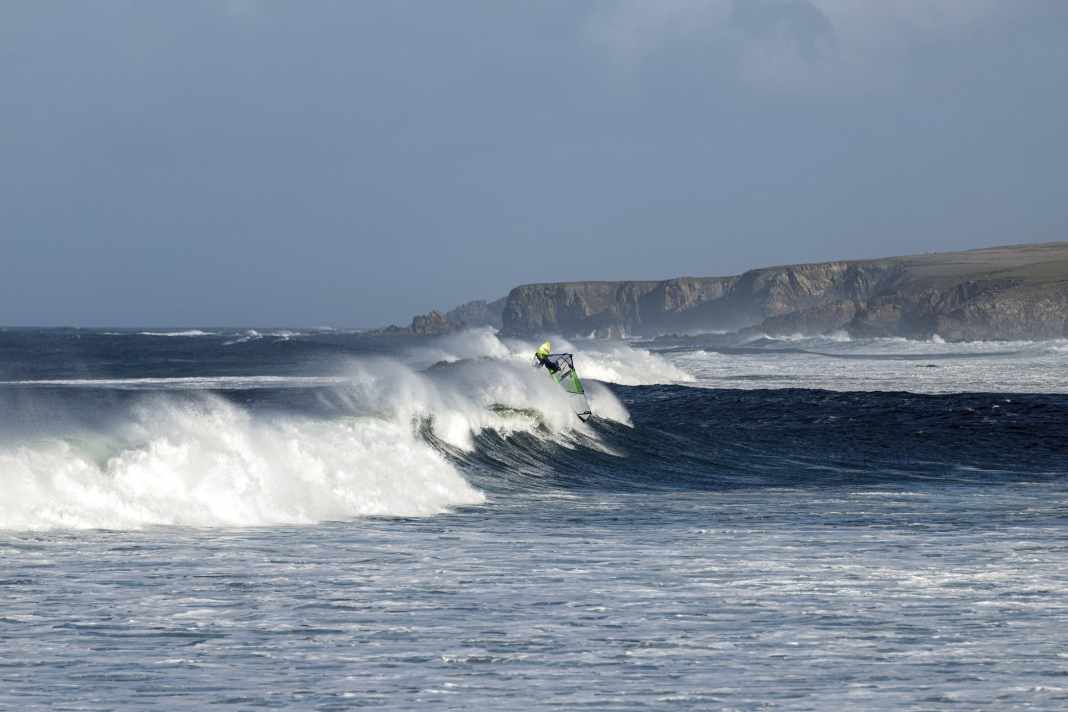





- Scotland in a van - not everyone's cup of tea
- A lengthy DIY repair saves the trip
- Lots of surfable waves, lots of rainbows, and finally lots of wind
- The beauty of the Orkney Islands
- Adventure road trip in Scotland
- Flat tyre in the middle of the wilderness
- The fastest repair of my life
- Storm "Ashley" brings great sessions
- Sightseeing highlights on the way back
To get straight to the point: Our last road trip to Scotland wasn't quite as dramatic as the title might make it sound. Nevertheless, we had to contend with several minor disasters, which in total caused us some stress during our holiday, albeit a completely different kind of stress to that which we are used to from our everyday working lives.
It's amazing how quickly the focus and importance of problems shift when you can take a longer break and don't have to worry about office problems. Other challenges arise, which in turn can trigger stress, but which also give you a clearer view of the problems of everyday life and show you that there are things that can be much more elementary and significant than the challenges you encounter time and again, especially at work. Positive stress? No, not necessarily ... More like deeper, existential stress, accompanied by concerns and even fears in some situations. But more on that later ...
Scotland in a van - not everyone's cup of tea
"Scotland? In October? In a van? Why would you do that to yourself?" This was my tennis coach's question when I told him that I wouldn't be able to take part in training for four weeks in October for a valid reason. Well, not everyone has the same ideas about holidays. But the prospect of three and a half weeks on the bus with my wife and our two dogs, impressive nature, great hikes, empty beaches, lots of wind and certainly an adventure or two quickly appealed to us so much that there was no doubt in our minds that we had made exactly the right choice of destination and time of year for our needs - hiking, windsurfing, lots of nature, few people.
And so the ferry from Calais to Dover was booked, the bus was loaded with clothes, food, lots of water toys, dogs and dog food, and we found ourselves travelling south on the A7 - just like Thomas E, with a tailwind and on our way to new paths. Our plan was to drive to Inverness as quickly as possible, and from there to cover the north-east, north and north-west coasts of Scotland before heading to the islands in the west (Isle of Skye, Lewis and Harris etc.).
Also interesting:
A lengthy DIY repair saves the trip
While the journey to the UK, including the crossing of the English Channel, went smoothly, the first challenges arose between Newcastle and Glasgow. In the morning, after a wonderful night on a small lake, there was suddenly several centimetres of water in our van. When troubleshooting, I quickly found a leak in the pressurised water system of our van. After a few unsuccessful do-it-yourself attempts to fix the fault by tightening hose clamps on connecting pieces of the water system in the tail of the van somewhere behind the auxiliary heating, we booked an appointment at a campervan workshop south of Inverness (highly recommended: highlandcampervans.com), but were stuck for three days as a result.
After a wonderful night at a small lake, there were suddenly several centimetres of water in our van."
This was supposed to be the start of our tour, but now we had serious fears that we might even have to cancel the trip if the fault could not be rectified. Without a functioning water system, wild camping is rather stupid, especially in late autumn. Unfortunately, the workshop in question was unable to help us, as different hose diameters and connectors are used for campervan conversions in the UK than here and there were no suitable spare parts available. At least we got a tip on where we could get new connectors. In a second DIY session, I was finally able to successfully repair the leaks in the water system by using new connectors after several hours of fiddling around in the tail of our van in five-degree temperatures and rain, including completely dismantling the auxiliary heating and some improvisation. We were lucky - we only lost time, but now we could finally continue.
Lots of surfable waves, lots of rainbows, and finally lots of wind
Once we were back on our feet, we finally set off northwards the next morning. According to the motto "Now let the games begin!" we slowly immersed ourselves in the sparsely populated areas of Scotland and found deserted, beautiful landscapes, nature and sometimes beaches with waves that definitely have good potential for surfing or windsurfing on every hike along the lochs (lakes), in the mountains or on the impressive cliffs. On the tour to the north, however, we weren't lucky enough to find a wavy spot with the right wind direction and strength. But then again, we were only at the beginning of our trip ...
What would have annoyed other tourists gave me my second windsurfing session, albeit in onshore winds with rain."
Due to the weather forecast, which predicted a lot of rain on the mainland, we decided to take a trip to the Orkney Islands in the north-east of Scotland. The islands are very exposed in the North Sea, so they catch a lot of swell and are very well ventilated. At the same time, it is quite humid there. In autumn at least, it's almost always raining somewhere. Almost every landscape photo shows a large dark cloud and you can see and sense heavy rain in the distance. As a result, there are usually beautiful rainbows to marvel at several times a day. On the other hand, when rainy days are on the cards, the weather is often much better than you might expect. Sun, clouds and rain often change at breakneck speed, and if the weather doesn't suit you at the moment, it's worth taking another look at the sky five minutes later, when it often looks completely different. Within less than ten minutes, we experienced a change from calm, sunshine and 15 degrees to torrential rain, eight to nine wind forces and an air temperature of five degrees. What would probably have annoyed other tourists gave me the second windsurfing session of our trip, albeit only in onshore conditions in the rain, but still with the 3.8 sail, which was actually far too big.
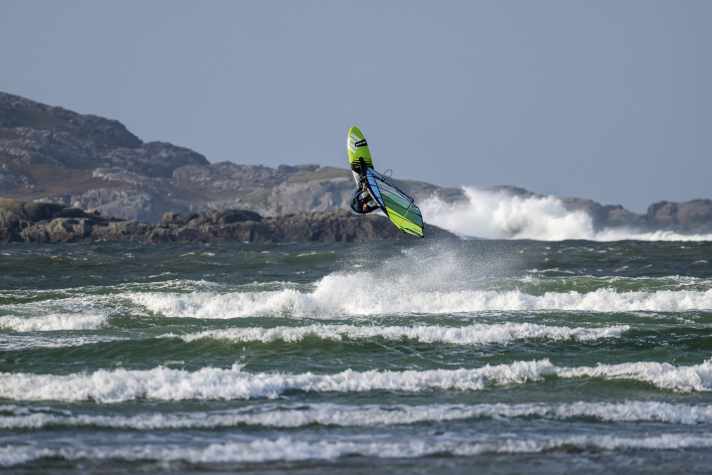
The beauty of the Orkney Islands
Apart from the capricious weather, the Orkneys are inconspicuously beautiful. Travelling overland, they can seem a little monotonous - fields, sheep and cattle as far as the eye can see. But the coasts are of fascinating beauty, very varied from sandy beaches to high cliffs, and are home to many seabirds and sea creatures. For example, you can observe a particularly large number of seals or be watched by the curious little animals as they repeatedly poke their heads out of the water. Interestingly, our dogs in particular seemed to attract the attention of the seals, which gave us the opportunity to take some nice shots of them in the water.
We also suddenly faced a new challenge on the Orkneys. Our older dog Mali suddenly started vomiting several times a day. She was going over her meals several times a day, and after three days on a light diet with no real improvement, we were starting to get seriously worried about our little furry friend. It doesn't take long to imagine the worst-case scenarios in a situation like this, especially as there aren't many vets in the north of Scotland and they have to cover large areas. As it happens, however, there is a very good practice on the Orkneys where, after a few injections and a thorough examination, we were given the all-clear and given medication for further treatment. These actually worked and you could tell from day to day that Mali was getting better. Lucky her ...
Adventure road trip in Scotland
Back on the mainland, we followed the north coast from east to west. Up here you are in the middle of the Highlands. Narrow, often very narrow, single-track roads with potholes are the norm here, even on the main arterial roads of the North Coast 500, one of the most popular tourist routes. This works better than you might think, simply because there is little traffic and you rarely have to use the existing passing bays. Furthermore, the Scots in the far north are characterised by an extremely defensive driving style, as if there was a competition to see who would give way to the other more often and in a friendlier manner and let them pass at one of the "passing places". I could hardly imagine that in Germany, and the state of the roads would certainly lead to widespread outrage.
The landscape along the north coast is varied and stunningly beautiful. It changes from moorland-like flat areas and lots of ferns in the north-east to more mountainous landscapes in the north-west, interspersed with numerous lochs. Each loch is more beautiful and picturesque than the next. Well-behaved sheep, who all seem to have paid close attention during their traffic lessons, line the roads in the Highlands and cover the meadows with white dots, shaggy Highland cattle stand around every other bend, and you can always hear the red deer roaring on the mountain slopes, especially in the rutting season, at dusk and at night. Now and again, these impressive animals almost run in front of your car or simply cross your path at a short distance during hikes. We were lucky enough to observe large stags at relatively close range on several occasions.
Flat tyre in the middle of the wilderness
However, we also had the misfortune of overlooking a ditch and a large, sharp stone lying in it when leaving a viewpoint at one of these holes. As we drove onto the road, the right rear wheel of our van slipped into the ditch and the next moment, apart from the rumbling, all you could hear was a lot of air escaping from the tyre in a very short space of time. We had a flat tyre. In the middle of the Highlands. On a Sunday afternoon. Far away from any major town.
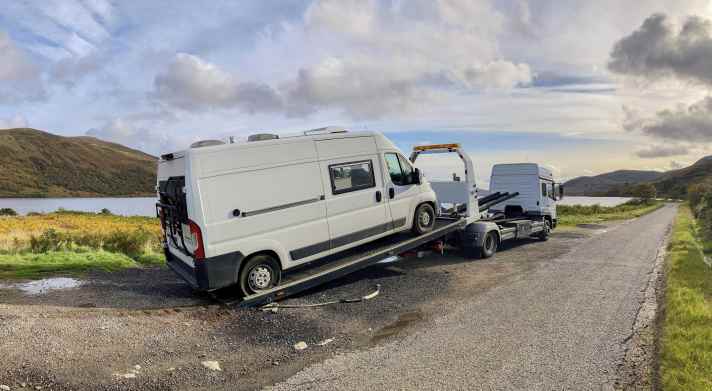
And of course, as is usual with more modern vehicles, we didn't have a spare wheel with us, just some stupid puncture spray ... We just about rolled into a small parking bay at the side of the road and were therefore at least not an obstacle for other vehicles. But there were hardly any of them there anyway. The tyre didn't look good and had already slipped off the rim a bit. Stuck like this in the Scottish loneliness, you quickly start to worry about your existence. How long would water, supplies and gas for the heating last if necessary? Fortunately, we had only recently topped everything up, so we wouldn't starve or freeze to death on the first night.
The fastest repair of my life
But once again, we had a stroke of luck. After all, we were by a beautiful lake and even had weak mobile phone reception in some places nearby - which is anything but a matter of course in the Highlands. The first of the very rare passing cars stopped as a matter of course, and an extremely friendly and local Scotsman explained to us that the nearest major garages with road recovery services were in Thurso, Inverness and Ullapool. All several hours away and therefore correspondingly expensive and time-consuming. But he had the number of a mechanic from the nearest town, Tongue, who he was actually able to reach on his mobile phone on the third attempt.
An hour later, he, a much older but also very friendly Scotsman, actually arrived with his tow truck, piggybacked our van and took us to his garage - despite it being Sunday. However, "garage" sounds a bit too fancy for the shack-like, dirty and cluttered old garage, which had seen much better days. But if they would help us, anything was fine with us. Our friend and helper didn't have a suitable spare tyre for us, but when we inspected our rear wheel, it turned out that it wasn't the tyre that had been damaged, as I had suspected, but the inside of the rim had been significantly dented by the stone, so that it could no longer seal.
Without many words, the old Scotsman fetched a sledgehammer and used it on our wheel rim."
While I was already calculating in my head how long it might take to get a new rim in this remote part of the world, the old Scotsman unceremoniously fetched a sledgehammer from his workshop, stood with both feet on the rim and worked on it for a few minutes with the crude tool. I could hardly believe my eyes, but after a few powerful and targeted blows, the rim had almost regained its old shape, and lo and behold - it sealed again. In Germany, nothing would have happened before Monday, a rim and two tyres would have had to be reordered, which would have taken at least three days and meant a hefty bill. Here, we paid a very reasonable £100 - around €115 - for towing, "repair" and Sunday surcharge, plus a generous tip, and the job was completed within two hours with a few good hammer blows. The man was still able to improvise and knew his trade ...
At some point the superlatives run out
After the quickest car repair of my life, we were back on the road and able to continue our journey along the north coast. Another stroke of luck, and I had spent all my thoughts about surviving for several days in the Highlands far from civilisation for nothing. Nevertheless, it was clear that the next major investment would be a replacement wheel for the bus. And that would be before the next journey.
Our tour took us across the north-west towards the Western Isles. Before we arrived on the Isle of Skye, we saw several beautiful bays, empty and unsurfed waves and a lot of impressively beautiful nature that never ceased to amaze us. At some point you run out of superlatives when you turn the next corner and the view over the lochs, moors and mountains is even more beautiful than before. Simply fabulous ...
Storm "Ashley" brings great sessions
As we like it to be as deserted as possible, we quickly crossed over from Skye to the Outer Hebrides. We had planned one day on Uist and three days on Lewis and Harris. The latter is an island whose northern part is called Lewis and whose more mountainous southern part is called Harris. Here you can find everything we have experienced on our trip so far in a small area: cliffs, moors, wide open spaces, sheep, highland cattle and red deer, seals, wind and waves.
Speaking of wind and waves: We had barely set foot on the islands when it became apparent that the fierce storm "Ashley" was travelling across the Atlantic towards Ireland and Scotland. What led to two sessions in beautiful waves with side-off conditions before the storm, which I will remember for a long time, led to the next challenges. With gusts of up to 175 km/h forecast and after all ferries had been cancelled for our return day, we decided not to camp wild as usual, but to seek shelter and protection at an official campsite.
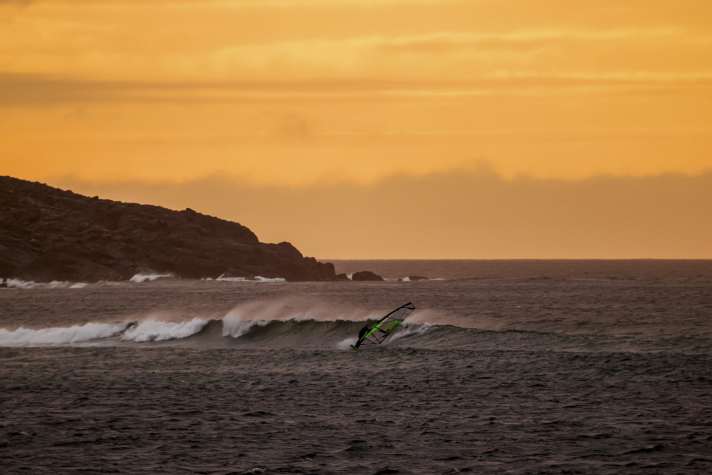
Due to the high storm warning level, we were a little worried, even though as northern Germans we are reasonably storm-tested. Despite the lee of other caravans and motorhomes, the night was very restless, and while Ashley was raging, we were constantly listening to see if we could hear any trees that might be dangerous.
But the storm was relatively short-lived, and after a few hours with measured gusts beyond twelve Beaufort, the weather calmed down again by the morning without leaving any major marks. However, the storm had damaged the ferry terminal on the Isle of Skye, so there were a few hours' delay before we were able to leave Lewis and Harris again. The "won" day on the island then offered the opportunity for another very nice windsurfing session, this time with small waves and sideon conditions for jumping, but again with plenty of pressure in the 4.6 sail.
Sightseeing highlights on the way back
After arriving back on the Isle of Skye, the return journey to the south-west went smoothly. We still had time to take in a few tourist highlights, such as the famous Fairy Pools on Skye (which are much less spectacular in reality than the familiar pictures from travel guides and the internet would suggest), Eilean Donan Castle, one of Scotland's most famous castles, known from "Highlander" and the James Bond film "The World Is Not Enough", as well as Glencoe, perhaps the most beautiful valley in Scotland.
Overcoming small crises and problems together can also bring people closer together when travelling."
On the way home, we were accompanied by many memories of impressive nature, of waves that normal mortals certainly only rarely experience in their lives, and the realisation that many everyday worries and problems from the job become much less important when you are in nature - and especially when something goes wrong. Existential worries and fears can arise surprisingly quickly and relativise the problems that you often have to deal with in normal life. On the other hand, overcoming small crises and problems together on a trip like this can also bring people closer together and actually enhance the many wonderful impressions. From our point of view, it is therefore worth foregoing hotels and comfort on holiday and going on little mini-adventures. Let's see which remote area our next road trip will take us to. Northern Finland sounds kind of exciting ... In any case, we have already bought and fitted the spare wheel that was sorely missed in Scotland.
